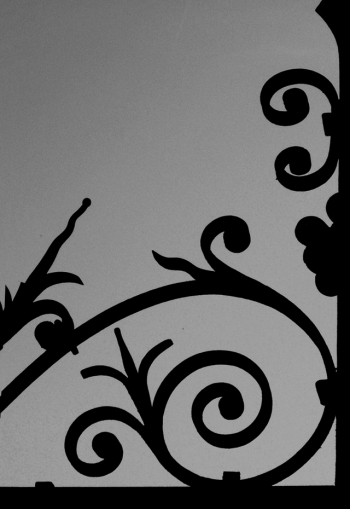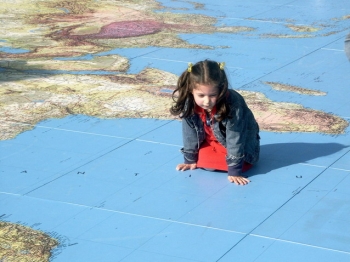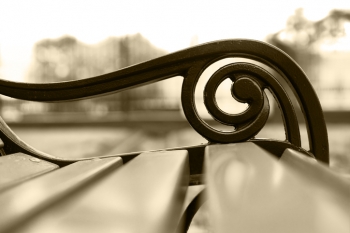
Blog (425)
My hope is to offer encouragement to writers as well as those who simply love to read. You will find eclectic snippets here—news of projects I’m working on, comments regarding books I enjoy, favorite authors, quotes, and reflections regarding my own experiences. I especially like to write about my dreams—those parables in the night seasons. Symbols and metaphors delight and intrigue me. You will find them here.
One of my favorite metaphors is the open gate. As I sit at the computer, I gaze at the collection of pictures on my wall. A black and white photograph shows a long road that leads to an opened gate. An expanse of land lies beyond the filigreed iron doors. I never tire of looking at this image as it evokes the promise of newness and hope. What will I find? What will I discover? The allure of mystery.
I must have the courage to pass through the gates. Sometimes I boldly stride through with confident expectation of what I'll find on the other side. Other times, I hover at the entrance, paralyzed by the uncertainty of that territory. More and more, I am practicing walking through the entry way, for God has opened those portals. He whispers in my ear, "Go on, go on. Good things await. Do not fear."
The Geography Of Laughter And Remembering
Written by Priscilla K. GarattiI stood in line to pay for my groceries at Walmart, the items already on the black belt that would send the eggs and baby spinach and balsamic vinegar to the cashier. I sensed someone behind me and turned around. A brown-skinned man held the smallest bike I'd ever seen--a pink and white Minnie Mouse bow nestled between the handle bars. Petite training wheels were attached on each side of the back tire. The man beamed, his smile as bright as the little white bike seat. I smiled back and motioned for him to go in front of me. He hesitated, then put the minuscule bike on the floor and rolled it down to the cashier. As he passed me, he said, "For my daughter." The man reached into his pants pocket and pulled out his wallet and paid cash. I couldn't help but overhear the cost. It was more than I'd have guessed. But this gift was perfect and gloriously pink. Worth every penny. The man picked up the bike and cradled it in his arms. He then turned to me, and we looked at each other for a brief moment. I was close enough to his face so that I could see smile lines etched around his shining eyes. He said, "Thank you." I replied, "Merry Christmas."
Later in the week, I sat with another man in my counseling office. A professional man, with an expensive haircut. I could see lines around his eyes too--worry lines. Words and tears spilled simultaneously. For the first time in his life, the man spoke of a father who had neglected him, been absent from the home. The man looked at me and asked, "How can I still be so emotional about my father decades later?" We processed many of his feelings, and he'd never considered the perspective of that brave boy who survived the pain--the resilience of that little boy who'd had to muster enough resilience to make it to adulthood. "I guess I just never looked at my childhood that way," he said. "This changes everything. I wasn't about me. It wasn't that I was unlovable. It was more about my dad than me." I could alost see the light bulb blinking in his head. He was getting it. The man smiled through his tears. "This is great. This is great. But, Priscilla, what if I get stuck? Start going backward and blaming myself for the mess in my life?" I said, "I know you are a man of faith in God, so when you get stuck, think of crossing the border into a new territory. It is a safe place, the place of laughter and remembering. It's a geography where God is laughing and smiling because He is so delighted with you. He's remembering all your milestones and rejoicing over you, his beloved boy. The new thought when you are stuck is to remember that you are the much-loved child."
The blue, gold, pink and green string of Christmas lights shone in the darkness of my living room. I wanted to feel festive. Surely the display should make me glad, should fill me with joy, this season full of reminders of God's goodness, the celebration of our great King, come in that paradox of humility and majesty. Yet I was not thinking these thoughts I sat on my red-cushioned sofa, a leopard-print throw draped around my shoulders, feeling fear. I felt so well physically, I wondered out loud, "Could this good feeling last? What if the cancer returned?" I couldn't even remember the name of the wretched type of tumor that invaded my body. Stupidly, I got on my phone and found the tumor's name, the memory of experiencing chemotherapy seeming to choke me. Why had I done that? Dredged all that up? Now the grim name seemed to cast shadows in my living room filled with the vintage-colored lights.
Then, like always, the beauty and power of Scripture rescued me. I remembered that each time before I entered the chemo treatments, I read out loud Psalm 18. It is the Psalm that David wrote and sang to God after being saved from all his enemies and Saul. I needed rescue from my enemy. Each time I read David's words, I was revived with courage, with hope, with strength. I got out my Bible, its pages awash with a pink glow from the Christmas lights, and began to read out loud.
~This was the skin that protected you from the world--this loving of another person you shared your life with.--Elizabeth Strout (From Anything Is Possible)
I opened the app on my phone to see a photo I looked at for a time. I observed my husband gently spooning warm broth to his mother who lay in a hospital bed. Giovanni's strong hand gripping the spoon stood in stark contrast with his mother's vulnerable posture. I noted the silver bracelet he wears around his right wrist, his only adornment, like a symbol of royalty.
Giovanni's mother fell. She needed bed rest. His first response was to go to her. He had just returned from a trip to his homeland in Italy. Yet he decided to go back immediately. This response to serve courses through his DNA. I liken this trait to a vast blue sky that lives within him, that inhabits him and drives him to serve others. When I looked at the picture, I felt the brilliance of that sky well up within me too.
My study is like a bench of contemplation this morning. The rain streams down the window pane so that I cannot go outside to think and ponder. Yet this warm office suffices as a room to contemplate, a candle burning, its winter pine scent permeating the air. I hear the ticking clock--like the heartbeat of time, patiently marking my life--moving forward with each beat.
I pause to ask myself some questions as 2018 nears its close and 2019 hovers just ahead.
I like taking inventory--making adjustments. What do I keep? What do I add? Where do I let go?
I wondered if perhaps you might like these questions too...




